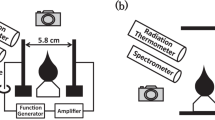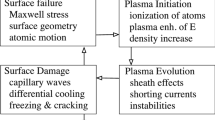Abstract
AN investigation of certain spectral lines emitted in a high-voltage arc between brass electrodes in nitrogen gas was made under pressures of from 1/7 to 85 atmospheres. The arc was run in and out of a magnetic field of 4,000 gauss. An empirical relation between the shift with and without a magnetic field at varied pressures for nine spectral lines has been found. There was a certain amount of scatter in the shifts of the lines, but among the hundreds of measurements of the spectral lines studied from Eastman Kodak spectrum analysis No. 2 plates, a significant pattern of shifts was found which differed for emission in a magnetic field from emission in a nonmagnetic field.
This is a preview of subscription content, access via your institution
Access options
Subscribe to this journal
Receive 51 print issues and online access
$199.00 per year
only $3.90 per issue
Buy this article
- Purchase on Springer Link
- Instant access to full article PDF
Prices may be subject to local taxes which are calculated during checkout
Similar content being viewed by others
Author information
Authors and Affiliations
Rights and permissions
About this article
Cite this article
MILLER, R. Shifts of Arc Lines at Various Pressures in Magnetic Fields. Nature 182, 1295–1296 (1958). https://doi.org/10.1038/1821295a0
Issue Date:
DOI: https://doi.org/10.1038/1821295a0
Comments
By submitting a comment you agree to abide by our Terms and Community Guidelines. If you find something abusive or that does not comply with our terms or guidelines please flag it as inappropriate.



